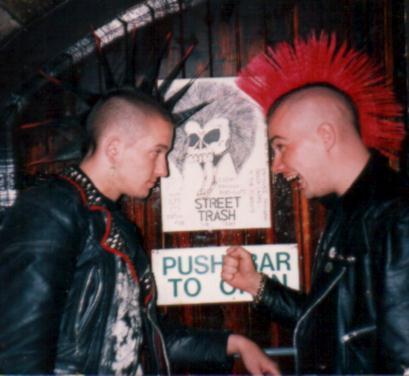
What were punks rebelling against? They were rebelling against the establishment, the commercialization of music, hippie culture, and the general economic hardship in the UK and Europe.
The word punk probably started as an insult that the punk movement took control of and owned. Punk meant “something worthless”, “inferior”, “bad”, “a worthless person”, and “a criminal”. The word was first used to refer to the music in 1970., in Chicago.
People probably have the image that punk started in the UK. It arguably became huge in the UK, but it has its roots in New York in the late 1960s and early 1970s. In the 1960s, a type of music called Garage Rock sprang up in America and Canada. It was rough, raw, emotional, and it used basic chord structures. It was called Garage Rock because people made it in their garages. By the end of the 1960s, Garage Rock began to fade away as there was an invasion of British pop acts into America, namely the Beetles. The Beetles were enormous and a lot of copycat acts set themselves up and a lot of one hit wonders appeared to try and cash in on the success, style, and image. People started trying to make music that would sell, rather than just music for music’s sake, and producers were always looking to find the next Beetles. Since the beginning of the 1960s, the recording industry had become huge and immensely powerful. They controlled what bands played, they controlled the recording studios, and they controlled what music was played on the radio. Punk music in America rose up to fight this. They rebelled against the type of music and the way music was produced. They made rough, emotional music that was played in clubs and on radio stations that the music industry couldn’t control. It spread through word of mouth.
Punk music may have begun in America, but the punk movement appears to have begun in the UK, probably fueled by the dire economic situation in the UK at the time. The punk music scene also existed in the UK at this time, but it wasn’t yet the movement it would become. However, from 1973, both the US and the UK began to go into a depression. This was partly caused by the 1973 oil crisis where the OPEC countries stopped selling oil to most western countries, but there were many other causes as well. The US was more financially able to weather the depression than the UK was and unemployment sky rocketed. The UK had been a major industrial nation, but ship building, coal mining, and many other industries were now too expensive to operate in the UK. Strikes increased, inflation increased, unemployment increased, and there was a feeling that everything was doomed. This is the environment that the punk movement came out of. Margaret Thatcher became prime minister in 1979 and she started a program of de-industrializing the UK, which only worsened the situation. People who grew up in many of these poor areas could see no future and had no hope. There was nothing for them to do.
The punks were also rebelling against the hippie ideology that had existed since the early 1960s. The hippies were for love and peace, which made sense because they had grown up with the Second World War, Korean War, and the Vietnam War. They were in favor of peaceful protest, very much along the lines of Gandhi. The punks were the exact opposite. They believed in violent protest, making a stand, pointing out what is wrong, and fight “the man”. The hippies wanted to show their rebellion in the way they lived and dressed, and the punks felt exactly the same. They dressed as violently as they felt. The punks also hated the fact that the hippies could generally afford to drop out and live their lifestyle. Hippies were generally educated, middle-class kids protesting against their parents’ generation. With many hippies it was a life choice, but with a lot of them, once they had spent a few years as hippies, they went off and joined the corporate world. The punks hated that hypocrisy. Punks were also generally poor, working class, less educated kids, who couldn’t work and couldn’t afford anything. This made them angry.
Punks were also rebelling against the establishment because they blamed the people in charge for the way the UK had become. The government, the police, the corporate world, and the royal family were all to blame. Punks were rebelling against many other things as well, but these are a few examples. It can be said that because of the punk movement was inevitable because of the movements that had gone before them, the media, and the economic conditions. And this is what I learned today.
Image By Pax – Transferred from pl.wikipedia.org to Commons., Public Domain, https://commons.wikimedia.org/w/index.php?curid=2118607
Sources
https://lordslibrary.parliament.uk/the-uk-economy-in-the-1970s
https://www.etymonline.com/word/punk
https://en.wikipedia.org/wiki/1973%E2%80%931975_recession
https://www.thebristorian.co.uk/essays/1970s-rebellion-punk
https://en.wikipedia.org/wiki/Punk_ideologies
https://www.soundoflife.com/blogs/mixtape/history-punk-music
https://en.wikipedia.org/wiki/Garage_rock

Pingback: Why is breakdancing called breakdancing?